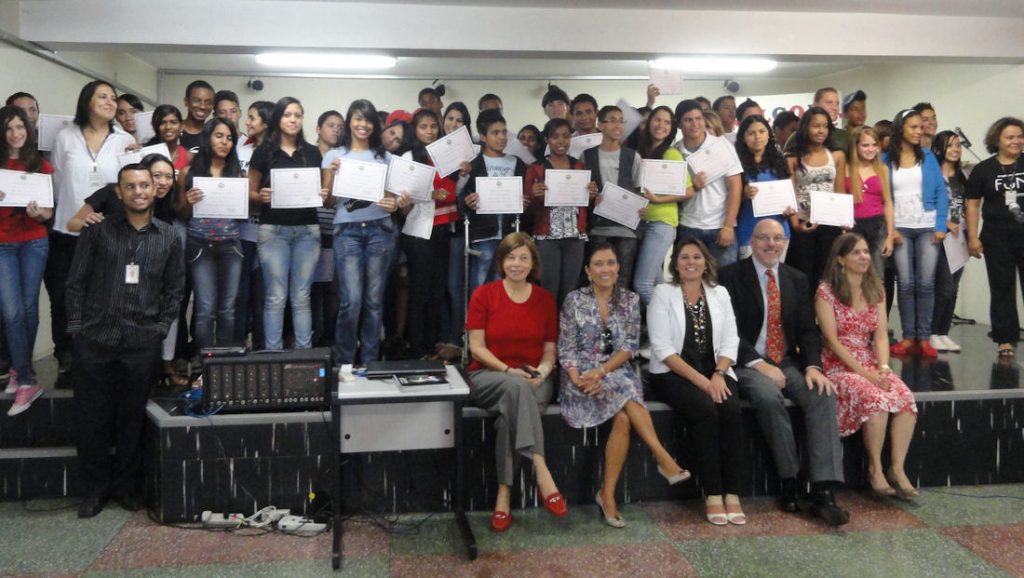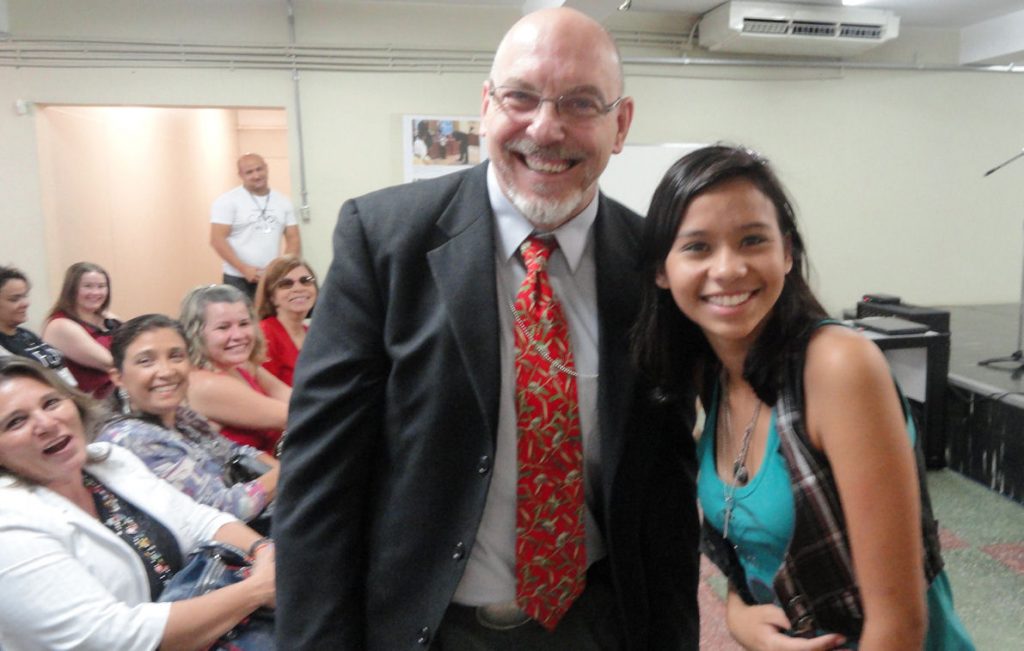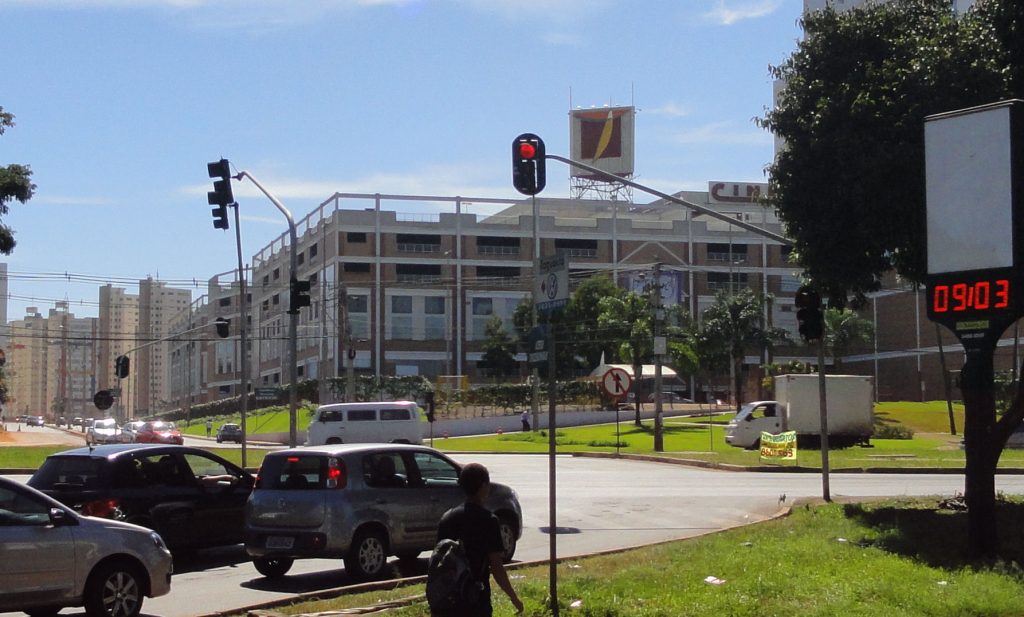
It is always an honor to meet kids that are so hard-working and a pleasure to share in their aspirations. This is what I got to do yesterday at the Casa Thomas Jefferson branch in Taguatinga, a satellite city near Brasília, when I met this year’s English ACCESS students and presented them with their scholarship certificates.
Fifty-four new students got ACCESS scholarships, which gives them two years of English study at our BNC (We cover the cost of fifty; CTJ adds in four more.) The kids are all low income and from disadvantaged backgrounds. English will give them a big boost and will help boost their communities. Being involved is also good public diplomacy for us. It helps build and maintain the web of relationships on which our good relations ultimately depend.

Relationships are why I think it is so important for us – for me – to be part of these things. I was talking to my colleague Marcia about that on the way to Taguatinga. Since I just got back to Brazil the morning before, I had a lot of work to catch up, lots of paper to push. I was really “too busy” to take the time out for this ceremony. But we work through Brazilian people. My job is relationships. Paper pushing is only a means to that goal. Our program CAN go by itself. We can pay the money and forget about it. But that is like planting a garden and not taking advantage of the fruits and flowers.

An American diplomat is sufficiently rare in the lives of these students that I believe that they will long remember that I shook their hands, called them by their names and gave them their certificates. It gives their program an American face – literally. Of course, I also had the chance to renew my acquaintance with school leaders from Brasília and our friend at the BNC. This is what public diplomacy is about.
Marcia wrote my comments, which I have included below for reference. I still don’t trust my Portuguese to completely. Besides, at official events it is important to hit the main points but not to talk too long. W/o prepared remarks, I tend to ramble on too long. I ad-libbed a few comments at the end. I thought it was important to tell them a little about their own importance for the future of their country. Talented people have the privilege and a duty to develop their skills for the good of their country and the world in general. We need to remind ourselves and others of that. I find that most young people are receptive to that message. They want to be part of something bigger than their daily lives. I also wanted to remind everybody about the Science w/o Borders initiative and the opportunities and responsibilities that it brings.
The CTJ in branch in Taguatinga teaches around 1,250 students. Among them are 250 who get their instruction at a local High School – Leonardo Da Vinci – after school. CTJ pays the school 10% of what they get in tuition. It is easier for students just to stay a little longer at school than it is to fight traffic to get to the CTJ facilities. This is a good partnership that benefits all around.
CTJ people tell me that there can be significant differences among the students they attract in different locations. The Lago Sul campus gets mostly upper and middle class students. They often spend a long time at CTJ and learn to speak English almost flawlessly. Taguatinga is not much like Lago Sul. Most of the students there are poor and many come from single parent households. It is harder for them to continue their English educations, but it is a tribute to them and their parents that they continue to show up.
The ACCESS program in Taguatinga has an excellent retention record, despite the challenges of its students. Of the 54 students who entered the two-year program in March of last year, 52 have returned for the second. CTJ staff is active in creating this happy result. The CTJ teachers and administrators take it personally. I heard one story about a young woman from last year’s class who was going to drop out. She was getting married and her prospective husband thought that she had better uses for her time than to study English. The CTJ director called the future husband and explained what a rare opportunity this was and that he should not take it away from her. The young man relented and the young woman returned to class to finish what she had begun. I wonder what changes this intervention will make in her life and the life of her community.
In all there are 1,147 students in the ACCESS program in Brazil, in Recife, Sao Paulo, Salvador, Porto Alegre, Manaus, Rio de Janeiro, Belo Horizonte and here in Brasilia.
My picture up top is the class picture. You may notice that most people seem not to be looking at the camera. This is because there were multiple cameras. The picture taking can take a long time; everybody wants a photo. The middle picture is a student from last year’s class and me. She had the scary task of giving a speech in English to the new students. She did very well. The bottom picture is the street outside the BNC.
Remarks below, FYI:
– Muito obrigado, Ana Maria!
– Muito obrigado à Casa Thomas Jefferson, à Secretaria de Educação do Distrito Federal e à Diretoria Regional de Ensino do Recanto das Emas pela importante parceria na implementação do Programa ACCESS.
– Bom dia, alunos do programa ACCESS e PARABÉNS pela bolsa de estudos!
– Vocês agora são alunos ACCESS da Casa Thomas Jefferson e participantes nesse importante programa de ensino de inglês, cultura americana e responsabilidade social.
– Sintam-se orgulhosos! Vocês fazem parte de um grupo de aproximadamente 1,150 (mil, cento e cinquenta) bolsistas Access espalhados pelo Brasil em cidades como Brasília, Manaus, Recife, Salvador, São Paulo, Belo Horizonte, Rio de Janeiro e Porto Alegre.
– À medida em que o Brasil cresce no cenário internacional, surgem muitas oportunidades e é muito bom ver que vocês já estão começando a se preparar aprendendo inglês.
– Além de abrir portas no mundo profissional, o inglês também permitirá que vocês busquem interessantes oportunidades de estudo no exterior, com programas como o Jovens Embaixadores, o Ciência sem Fronteiras e muitos outros que existem.
– Sejam curiosos, perguntem, participem e aprendam bastante. Da próxima vez que eu me encontrar com vocês, conversaremos em inglês,
– Novamente, parabéns e muito sucesso para vocês!
– Muito obrigado!
